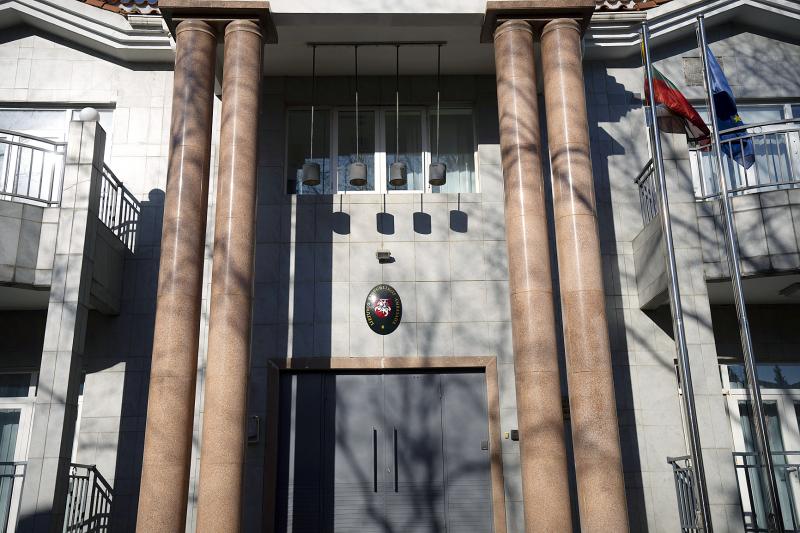The US and Germany on Wednesday backed Lithuania in its spat with China, saying the pressure exerted by Beijing against the tiny Baltic nation was unwarranted, while China yesterday countered that Washington was using Vilnius and Taipei “to contain” Beijing.
Lithuania last year let the Taiwanese office in Vilnius bear the name “Taiwanese,” instead of “Taipei,” which many countries use to avoid offending Beijing.
Lithuania’s move infuriated Beijing, which withdrew its ambassador to Vilnius and expelled the Lithuanian ambassador to Beijing.

Photo: AP
“We have immediate concern about the government of China’s attempts to bully Lithuania, a country of fewer than 3 million people,” US Secretary of State Antony Blinken said after a meeting in Washington with his German counterpart.
Blinken said that China had been pushing European and US companies to stop building products with components made in Lithuania or risk losing access to the Chinese market.
“This isn’t just about Lithuania, but about how every country in the world should be able to determine its own foreign policy free from this kind of coercion,” he said, adding that the US would work with its allies to diversify supply chains and counter “all forms of economic blackmail.”
German Minister of Foreign Affairs Annalena Baerbock said that “we as Europeans stand in solidarity at Lithuania’s side.”
US Trade Representative Katherine Tai (戴琪) told Lithuanian Minister of Foreign Affairs Gabrielius Landsbergis during a call on Wednesday that the Baltic nation had Washington’s support to counter what they called China’s “economic coercion.”
The two officials pointed out that the US and the EU “as democratic market economies, share a number of core values and principles that we need to defend internationally.”
Lithuania faces unofficial trade hurdles with China, which denies it is blocking the nation’s exports. The EU has raised the issue with the WTO.
Chinese Ministry of Foreign Affairs spokesman Wang Wenbin (汪文斌) said Washington was using the Baltic state to “use Taiwan to contain China.”
“The US side has defended Lithuania’s erroneous act of creating ‘one China, one Taiwan,’ and attempted to put together a small clique condoning the Taiwan independence forces,” Wang said at a daily briefing.
Wang also blasted Taiwan’s move to create a US$200 million investment fund for Lithuania to offset China’s economic reprisals as “dollar diplomacy,” adding that “soliciting foreign support to Taiwan independence will only lead to a dead end.”
Taiwan said it is ready to help Lithuania in resupplying trade.
“There are more than 120 sea containers — at least 1.5 million euros [US$1.69 million] worth — blocked by Beijing. We’re ready to take all of those and help Lithuanian companies,” Representative to Lithuania Eric Huang (黃鈞耀) said.
Presidential Office spokeswoman Kolas Yotaka on Wednesday announced the fund on Twitter.
“The way to confront bullying is not to give up, it’s to work together,” she wrote.
Additional reporting by Bloomberg

Conflict with Taiwan could leave China with “massive economic disruption, catastrophic military losses, significant social unrest, and devastating sanctions,” a US think tank said in a report released on Monday. The German Marshall Fund released a report titled If China Attacks Taiwan: The Consequences for China of “Minor Conflict” and “Major War” Scenarios. The report details the “massive” economic, military, social and international costs to China in the event of a minor conflict or major war with Taiwan, estimating that the Chinese People’s Liberation Army (PLA) could sustain losses of more than half of its active-duty ground forces, including 100,000 troops. Understanding Chinese

The Ministry of Foreign Affairs (MOFA) yesterday said it is closely monitoring developments in Venezuela, and would continue to cooperate with democratic allies and work together for regional and global security, stability, and prosperity. The remarks came after the US on Saturday launched a series of airstrikes in Venezuela and kidnapped Venezuelan President Nicolas Maduro, who was later flown to New York along with his wife. The pair face US charges related to drug trafficking and alleged cooperation with gangs designated as terrorist organizations. Maduro has denied the allegations. The ministry said that it is closely monitoring the political and economic situation

UNRELENTING: China attempted cyberattacks on Taiwan’s critical infrastructure 2.63 million times per day last year, up from 1.23 million in 2023, the NSB said China’s cyberarmy has long engaged in cyberattacks against Taiwan’s critical infrastructure, employing diverse and evolving tactics, the National Security Bureau (NSB) said yesterday, adding that cyberattacks on critical energy infrastructure last year increased 10-fold compared with the previous year. The NSB yesterday released a report titled Analysis on China’s Cyber Threats to Taiwan’s Critical Infrastructure in 2025, outlining the number of cyberattacks, major tactics and hacker groups. Taiwan’s national intelligence community identified a large number of cybersecurity incidents last year, the bureau said in a statement. China’s cyberarmy last year launched an average of 2.63 million intrusion attempts per day targeting Taiwan’s critical

‘SLICING METHOD’: In the event of a blockade, the China Coast Guard would intercept Taiwanese ships while its navy would seek to deter foreign intervention China’s military drills around Taiwan this week signaled potential strategies to cut the nation off from energy supplies and foreign military assistance, a US think tank report said. The Chinese People’s Liberation Army (PLA) conducted what it called “Justice Mission 2025” exercises from Monday to Tuesday in five maritime zones and airspace around Taiwan, calling them a warning to “Taiwanese independence” forces. In a report released on Wednesday, the Institute for the Study of War said the exercises effectively simulated blocking shipping routes to major port cities, including Kaohsiung, Keelung and Hualien. Taiwan would be highly vulnerable under such a blockade, because it